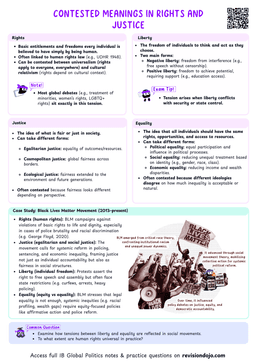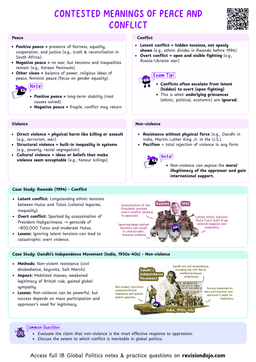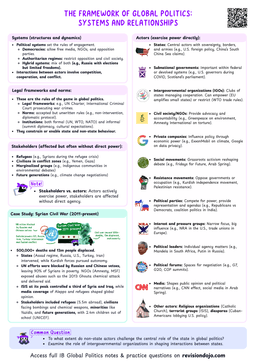Understanding State and Non-State Actors
State Actors
- State actors are entities that represent a government or nation-state.
- They have legitimate authority to use force and make decisions on behalf of their citizens.
- Military forces: Protect national security and sovereignty.
- Law enforcement agencies: Maintain domestic order and enforce laws.
- Diplomatic bodies: Engage in international relations and negotiations.
Non-State Actors
- Non-state actors operate independently of government control.
- They can be violent or non-violent and may pursue a wide range of goals.
- Terrorist groups: Use violence to achieve political objectives (e.g., ISIS, Boko Haram).
- Rebel movements: Challenge state authority, often through armed conflict (e.g., FARC in Colombia).
- Non-governmental organizations (NGOs): Advocate for social, environmental, or humanitarian causes (e.g., Amnesty International, Greenpeace).
- Multinational corporations (MNCs): Influence economic and political decisions through their global operations (e.g., Apple, ExxonMobil).
- The distinction between state and non-state actors is not always clear-cut.
- Some non-state actors may receive support from states, blurring the lines of accountability and legitimacy.
Violent State Actors
1. Military Forces
- Role: Protect national security, defend borders, and engage in warfare.
- United States military: Involved in conflicts like Iraq and Afghanistan.
- Russian armed forces: Engaged in Ukraine and Syria.
2. Law Enforcement Agencies
- Role: Maintain domestic order, enforce laws, and combat crime.
- Police forces: May use force in situations like riots or counter-terrorism operations.
- Special units: SWAT teams or counter-terrorism squads.
- While state actors have the legal right to use force, their actions are often subject to international law and human rights standards.
Violent Non-State Actors
1. Terrorist Groups
- Characteristics:
- Use violence to instill fear and achieve political goals.
- Operate outside legal frameworks.
- Al-Qaeda: Responsible for the 9/11 attacks.
- Boko Haram: Targets civilians in Nigeria and neighboring countries.
- Students often assume that all non-state actors are violent.
- Remember that many non-state actors, such as NGOs and civil society groups, operate peacefully and play crucial roles in global governance.
2. Rebel Movements
- Characteristics:
- Challenge state authority, often seeking autonomy or regime change.
- May control territory and engage in guerrilla warfare.
- The Syrian Civil War involves multiple violent non-state actors, including ISIS and various rebel factions.
- These groups have significantly impacted regional stability and international security.
Non-Violent State Actors
1. Diplomatic Bodies
- Role: Engage in negotiations, treaties, and conflict resolution.
- United Nations: Facilitates peace talks and mediates disputes.
- European Union: Uses diplomacy to address issues like trade and human rights.
2. Regulatory Agencies
- Role: Implement policies and enforce regulations.
- Environmental Protection Agency (EPA): Regulates environmental standards in the US.
- International Atomic Energy Agency (IAEA): Monitors nuclear compliance globally.
Non-Violent Non-State Actors
1. Non-Governmental Organizations (NGOs)
- Role: Advocate for social, environmental, and humanitarian causes.
- Amnesty International: Campaigns for human rights.
- Greenpeace: Focuses on environmental protection.
- When analyzing non-state actors, consider their goals, methods, and impact on both local and global scales.
- This will help you understand their role in shaping international relations.
2. Multinational Corporations (MNCs)
- Role: Influence economic and political decisions through global operations.
- Apple: Impacts global supply chains and technology markets.
- ExxonMobil: Influences energy policies and environmental debates.
- Think of state actors as the "official players" in a game, with clear rules and responsibilities.
- Non-state actors are like "wild cards" that can disrupt or enhance the game, depending on their actions and goals.
The Interplay Between Violent and Non-Violent Actors
1. Cooperation and Conflict
- State and non-state actors often interact in complex ways, leading to both cooperation and conflict.
- NGOs may collaborate with governments to deliver humanitarian aid.
- Terrorist groups may provoke military responses from state actors.
- The 2015 Paris Climate Agreement illustrates cooperation between state actors (governments) and non-state actors (NGOs, MNCs) to address global environmental challenges.
2. Impact on Global Politics
- Violent actors can destabilize regions, leading to humanitarian crises and international interventions.
- Non-violent actors can drive policy changes, promote human rights, and foster global cooperation.
- Identify three non-state actors and explain how they influence global politics. Consider both violent and non-violent examples.
Analyzing the Role of Violent and Non-Violent Actors
Key Considerations
- Legitimacy: Do the actors have the right to use force or influence decisions?
- Methods: Are their actions violent or non-violent?
- Impact: How do they affect local, national, and global politics?
- How do we determine the legitimacy of state and non-state actors?
- What role do cultural perspectives play in shaping our understanding of violence and non-violence?
- How do violent non-state actors challenge state sovereignty?
- What role do non-violent actors play in addressing global issues like climate change or human rights?
- How can states balance the use of force with diplomatic and non-violent approaches?
- The interplay between violent and non-violent actors highlights the complexity of global politics, where multiple actors with diverse goals shape the international landscape.


